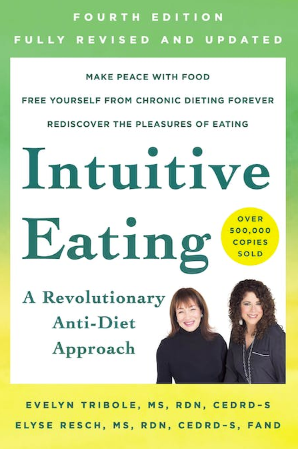Intuitive Eating: a Non-Diet Approach
Through the principles of intuitive eating, we can work to regain our inner wisdom and create a peaceful relationship with food and our body.
What is Intuitive Eating?
Intuitive Eating focuses on re-discovering an individual's connection with their inner body wisdom and learn to trust it again when it comes to food. The Intuitive Eating framework was developed by two registered dietitians, Evelyn Tribole and Elyse Resch, in 1995. The idea behind Intuitive Eating is to make food choices based on one's body intuition rather than external cues and food rules.
We are born intuitive eaters, with the instinct to recognize hunger and the drive to eat until full. Babies instinctively know how to listen to their hunger cues and stop eating when they are satisfied. However, as we grow older, external factors such as diet culture can disrupt this natural connection and lead to a complicated relationship with food.
Why is Intuitive Eating Important?
Diet culture plays a large role in disrupting our connection with our inner wisdom. We are taught to view certain foods as "good" or "bad," to finish everything on our plate, and to use food as a reward. Over time, this can lead to a distrust in our bodies and our appetites, causing us to lose touch with our innate connection to food.
So, what are the Ten Principles of Intuitive Eating?
Reject the Diet Mentality: The diet industry promotes weight reduction and false expectations that lead to feelings of failure every time a diet doesn't work. This can be difficult to let go, but holding on to hope that a new diet is around the corner may hinder your journey towards Intuitive Eating.
Honor Your Hunger: Nourish your body with adequate energy and carbohydrates to avoid excessive hunger. When you reach the stage of insatiable hunger, thoughts of conscious eating become irrelevant. Learning to heed this initial biological cue is crucial in restoring trust in yourself and food.
Make Peace with Food: End the food war and mental gymnastics! Give yourself unconditional permission to eat without restrictions. If you convince yourself that you can't or shouldn't eat a certain food, it can lead to feelings of deprivation that result in uncontrollable cravings and binge eating. When you finally “give in” to forbidden foods, it leads to feeling out of control, guilt, and shame.
Challenge the Food Police: Challenge the inner thoughts that label you as "good" or "bad" for following food rules. The food police include thoughts you have that enforce the unrealistic rules imposed by diet culture. Silencing these negative thoughts, hopeless sayings, and guilt-inducing indictments are crucial in returning to Intuitive Eating.
Discover the Satisfaction Factor: When following a diet, we often ignore the simple pleasure of eating. There is a difference between fullness and satisfaction! When you eat what you truly desire in a safe environment, the enjoyment you experience will help you feel fulfilled and content.
Feel Your Fullness: Explore your body's signals that indicate you are no longer hungry and that you are comfortably full. In order to accomplish this, you need to be aware of your hunger cues, nourish throughout the day, and give yourself permission to eat what you desire.
Cope with Your Emotions with Kindness: Food may suppress unpleasant emotions such as anxiety, loneliness, and boredom, but you might notice it doesn’t resolve your feelings in the long run. Experiencing unpleasant feelings is normal and it’s important to find gentle ways to manage emotions. Approach this with curiosity rather than judgment and treat yourself with kindness through this process.
Respect Your Body: Genetics play a large role in our body size, something we cannot change. It’s hard to reject the diet mentality if you are unrealistic and overly critical of your body size or shape. All bodies deserve respect. The goal is not always to love your body, but it can be a goal to take care of your body. A few ways to show respect to your body can be honoring your hunger cues, wearing clothes that make you feel good, and self care activities.
Movement—Feel the Difference: Are you moving because you “must” burn calories or you “should”? This thought process can make movement feel unsustainable and not enjoyable. Shift the focus to the positive feelings of movement such as energy levels, strength, improved stress levels, and sleep.
Gentle Nutrition: Make food choices that honor your taste buds, health, and what makes you feel good. This is the intersection of honoring your physical and mental well being. There is no such thing as a “perfect diet.” Remember, to be flexible and curious with how foods make you feel.
Now that we have gone through the principles of Intuitive Eating, what are the benefits?
Research studies show the benefits of intuitive eating include:
Higher self-esteem
Better body image
Lower triglyceride levels
Lower rates of disordered eating
This is a friendly reminder to be curious and kind to yourself through the Intuitive Eating journey. Schedule a session with one of our registered dietitians to guide you through this process and provide you with individualized support along the way.

